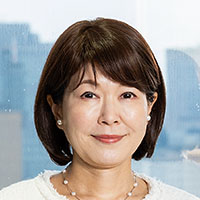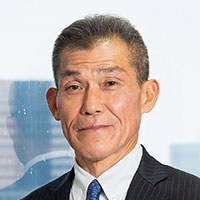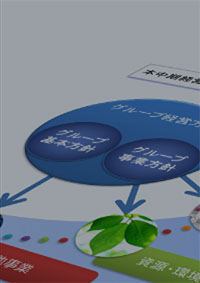- Home
- Sustainability
- Governance
- Roundtable Discussion among the Outside Directors
Roundtable Discussion among the Outside Directors
In aiming to realize OVOL Vision 2030, it is essential for the group to set a concrete path for how it will collaborate with stakeholders, drive transformation, and achieve growth.



Role of an Outside Director
It has been one year since I was appointed as an outside director of Japan Pulp & Paper. To briefly share my background, I have 40 years of experience as a banker. Specifically, I have worked in areas such as screening and sales, as well as human resources and internal control.
In my view, the role of an outside director is to monitor financial strategy, investment strategy, human capital management, internal controls, and other areas, and provide management oversight, thereby facilitating a company’s ability to achieve sustainable growth and enhance its medium- to-long-term corporate value. By oversight, I do not mean acting from a superior position, but rather supporting management by closely offering advice not only on prudent risk management (risk hedging) but also on appropriate risk-taking. Instead of optimizing individual aspects of management strategy, I take an optimal overall approach while avoiding the limitations of internal conventions (routine practices). I also strive to contribute by drawing on my knowledge as a banker to provide input on the company’s intended course from an objective position while remaining firmly aware of investor perspectives.
As an attorney now in my 27th year, with over 21 years of experience as an outside officer for listed companies, I have been involved in compliance and governance, including the provision of legal services, for companies and organizations of various sizes in different industries. As an outside director of Japan Pulp & Paper, I feel that, in addition to compliance and governance, the group’s Corporate Philosophy and the corporate culture of “trust” that has been built up over its long history are important. I intend to contribute to the development of frameworks for sustainable management, which will support the company’s pursuit of sustainable growth and solutions to social issues.
After gaining experience mainly in the environmental division of an electric power company, I became independent and have since been involved in environmental and energy policy research and advisory services, serving in roles such as a member of several think tanks, as a visiting professor at a university, and as a government delegate. Given that the environment and energy fields are now central to the management of Japan Pulp & Paper, I see one of my roles as outside director as providing long-term perspectives on management, informed by international trends.
Current State of Corporate Governance
With regard to management and corporate governance at Japan Pulp & Paper, what has left the strongest impression on me during the past year is the enthusiasm with which the management team tackles issues such as strategy and the extremely lively discussions that take place during Board meetings. I believe that the company’s governance framework, particularly the balance between execution and oversight, is functioning well, contributing to robust governance. My impression is that internal controls and corporate governance are functioning adequately thanks mainly to the attitude of top management, and internal audits are thoroughly conducted via on-site inspections.
I believe one area that could potentially be improved is group governance, including for subsidiaries outside of Japan. Although the company is named Japan Pulp & Paper, half of the group consists of companies located outside Japan. The company has adopted a “glocal” approach, delegating some degree of control to local management. Moreover, the growth strategy relies heavily on non-Japan M&As, and the expectation is that it will continue to add several companies each year. An extremely important challenge is therefore how to strengthen group governance within this glocal framework. I believe that further enhancing group governance and generating additional synergies will tie directly into the group slogan, “Paper, and beyond.”

One characteristic of governance here, as recognized by Mr. Takahashi, is the meticulous information-sharing and strong cooperation between the Audit & Supervisory Board, the Internal Audit Department, and the Board of Directors. The Audit & Supervisory Board operates through cooperation between full-time and outside auditors, ensuring appropriate reporting to the Board of Directors. Furthermore, the Internal Audit Office visits group companies, and produces detailed reports for presentation to relevant people. I believe this defensive governance approach is functioning effectively within the group.
As the group is actively pursuing M&As to support sustainable growth, offensive governance is also crucial. In recent years, many companies have newly joined the group inside and outside of Japan across different timelines and various industries, including both wholesaling and manufacturing. With this in mind, I believe that focusing not only on defensive governance but also on offensive governance—particularly in terms of group governance—will strengthen overall organizational capabilities and support sustainable growth.
Although this is an observation that relates more to corporate culture than governance, I find Japan Pulp & Paper to be a forthright, honest, and sincere company. For example, when there is bad news, or even when something is identified before it becomes an issue, President Watanabe always shares it at the start of Board meetings. I therefore feel the company takes a proactive stance to sharing not just good news but, more importantly, bad news.
However, given the company’s long history, there are times when I sense a high degree of homogeneity. As an outside director representing stakeholders such as investors, I sometimes wonder if certain perspectives or approaches are taken for granted. It is important that internal standards do not conflict with social norms, and I believe it is the responsibility of outside directors to act as a bridge between the company and the outside world.
Operation of the Board of Directors' Meetings
At Board meetings, substantive discussions are held in a free and open manner, without distinction between internal and external directors. These discussions focus on topics that support the sustainable growth of the group, such as OVOL Vision 2030, OVOL Medium-term Business Plan 2026, and various management challenges. For example, during the formulation of the new medium-term business plan, for which the quantitative targets were achieved, and spent time discussing everything from the background for the new plan to the process of setting goals using backcasting.
As Ms. Suzuki mentioned, the Board of Directors actively engages in discussions that contribute to improvements in corporate value, and my assessment is that the Board is fulfilling its role. In preparing OVOL Medium-term Business Plan 2026, detailed discussions that included analysis and confirmation of the management environment and other factors were held. In these discussions, President Watanabe stated that he “poured his soul” into the plan. I consider this a rare and exceptional statement that reflects his strong will as a manager. As such, the plan incorporates realistic goals designed for practical implementation, and I have high expectations for the execution of future strategies.
During the formulation of OVOL Medium-term Business Plan 2026, progress updates were provided four to five times. From a backcasting perspective, the key point is to consider what transformations are needed starting from the present moment and how to achieve growth in pursuit of the long-term vision, and subsequently articulate a concrete path to reach the envisioned destination. President Watanabe demonstrated significant leadership in establishing the necessary frameworks, and I believe this is reflected in the plan. As a result, I believe an excellent plan was developed.
In my view, two key areas of OVOL Medium-term Business Plan 2026 are the transformation of awareness regarding consolidated management and the strengthening of human resources. I will first address the transformation of awareness regarding consolidated management. This overlaps with what I mentioned earlier, namely, the further enhancement of group governance. Raising awareness of consolidated management among all group employees is essential for implementing the first of the three fundamental principles of the plan: “Expand communication within and outside the group to significantly increase the value provided by our functions, services, and other offerings.” The next important issue in the plan is the strengthening of human resources or, put differently, human capital investment. This involves exploring how to enhance the skills of group employees and increase the value of human capital. For example, we may consider sending employees from the head office to subsidiaries outside Japan or appointing them as executives of such companies. Conversely, bringing foreign management personnel to the head office is another option to consider. A rotation of talent, including personnel from other countries, is necessary. Such efforts will eventually lead to the development of management talent, and ultimately translate into a succession plan for executive roles.
However, as outside directors, we still lack a full understanding of the company’s personnel systems. For example, we are not yet familiar with the details of areas such as personnel structures and salary and bonus systems. Going forward, I believe it will be essential to hold discussions outside of Board meetings, focusing on specific themes to promote human capital management within the group.

On the topic of human capital, I believe the challenge lies in deciding whether to develop generalists or specialists. Both approaches have pros and cons, so I believe we need to consider human capital management policies within an overall strategic framework by, for example, exploring the state of human capital management within the entire Japan Pulp & Paper Group.
With regard to the evaluation of the Board’s effectiveness, the company conducts an annual self-assessment that is completed by each director, and requests input from each auditor. Based on this information, the effectiveness of the Board of Directors is evaluated, and I believe this properly ensures its effectiveness.
However, it is also important to assess effectiveness objectively. For example, while the current effectiveness evaluation questionnaire is well-designed, if repeated every year, it may become a routine exercise. In addition, from a third-party perspective, there may be feedback on the operation of Board meetings such as “conclusions are reached before discussions are finished” or “there is limited time for free discussion.” Governance has no predetermined goal, so I regard third-party evaluations and other inputs as a potential topic for future consideration with the view that they can energize Board discussions. I see no need to begin this process immediately, and I believe we should first enhance effectiveness by ensuring that outside directors fulfil their role, which is to bring external perspectives.
At present, the Board consists of seven members, three of whom are outside directors—namely, an experienced corporate manager, a specialist in the environmental and energy fields, and an attorney. We each have a different perspective and work to ensure that important decisions are not made solely based on the insights of inside directors. I believe this enables the Board to effectively fulfill its roles and responsibilities.
To further enhance the effectiveness of the Board, the company holds preliminary briefings, typically two days before Board meetings. Since last year, we have switched to a format where the executive officer responsible for the agenda presents the materials directly and shares comprehensive and detailed information, including background information on policies and measures. These thorough preliminary briefings enable the Board to concentrate on critical matters that need to be directly addressed with the management team.
The preliminary briefings have proven effective. In the past, time was sometimes set aside at Board meetings to explain the background of the agenda, but now, thanks to the detailed preliminary briefings, discussions during Board meetings have become more focused on the core issues. This saves time, allowing us to cover more topics. In this way, we aim to improve the efficiency of the Board.
I believe it is crucial to translate the discussions of the Board of Directors into action throughout the entire group, leading to self-driven change. We need to encourage a spontaneous internal movement where employees are motivated to change and drive transformation themselves. I hope that suggestions from outside directors, as third parties, can serve as a catalyst for positive influence on these internal changes.
In addition, the diversity of the Board, which is a prerequisite for its effectiveness, is sufficiently ensured, as is evident from our skills matrix. There are no pressing issues regarding the current skill set of the Board of Directors, and I do not see the need for immediate changes. However, as the group continues to achieve sustainable growth, this will remain an issue that I believe should continue to be discussed.
On the skills front, my impression is that the composition of the Board is extremely well-balanced. The proportion of female directors is also notably high for a company with such a long history. Regarding the skills matrix, while many companies generally indicate the relevant areas, Japan Pulp & Paper goes a step further by articulating how these skills are necessary for realizing the group’s growth story. I believe it is important to not merely disclose a skills matrix, but also to spell out how it ties in with the company’s objectives. This helps us better understand what is expected of us.
Toward the Realization of OVOL Vision 2030
Although this may be a somewhat general observation, it is fair to say that, from a sustainability perspective, the actions an individual company can take are quite limited. This is why it is becoming increasingly important to collaborate across the entire supply chain under a long-term vision. As a distribution company with a long history, the company is in a position to connect diverse stakeholders, and I believe our role in this is significant. Returning to this principle and collaborating with stakeholders to move toward a broader vision is essential, and I recognize that the group is extremely proactive in this regard. However, as a company with a corporate culture centered on forthrightness, honesty, and sincerity, I believe the key challenge will be how flexible and resilient it can be in responding to changes in the environment. In these rapidly changing times, I aim to serve as an outside director who functions as a representative of all stakeholders.
I believe that the group operates in a sector where social value and economic value can coexist more easily. For example, the group contributes to the reduction of plastic usage by promoting paper alternatives and has recycling businesses for both paper and plastic. I hope that it continues to steadily communicate this value, as well as the strengths of its traditional networks and the collective power of its diverse group companies, to all stakeholders at every opportunity.
As an outside director, I want to reaffirm to stakeholders that I will continue to closely monitor the progress of OVOL Medium-term Business Plan 2026 as the group strives to achieve its long-term vision. In addition, since the group is committed to sustainable management, I aim to monitor its effective implementation by obtaining information that is closely related to on-site operations. Last year, I had the opportunity to visit a logistics facility, and I plan to pay close attention to how well the targets of the plan align with on-site realities going forward.

The group has roughly 180 years of history, and sustainable management will be key to ensuring it continues to exist and grow 100 or 200 years from now. The necessary foundation for this will be human capital management, and strengthening this area will lead to better sustainable management, creating a virtuous cycle that will further enhance human capital management. I hope to help in this process from a management oversight position. Furthermore, as Japan makes strides in becoming a nation that excels in asset management, calls for management that takes into account capital cost and stock prices will only grow further. I therefore hope to fulfill my function in management oversight in my own way from an investor’s perspective.
Sustainability
-
Sustainable Management
-
Employees
- Work Environment
- Health Management Policy
- Occupational Health and Safety Policy
- Diversity and Inclusion
- Japan Pulp & Paper Executive & Employee Health Management
- General Business Owners Action Plan based on the Act on Promotion of Women’s Participation and Advancement in the Workplace
- Announcement of mid-career recruitment ratio based on the "Comprehensive Promotion Law on Labor Policy"
- General Business Owner Action Plans based on the "Next-Generation Support Measures Promotion Act"







